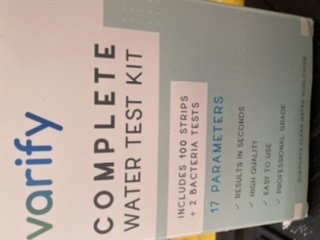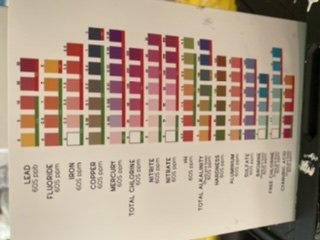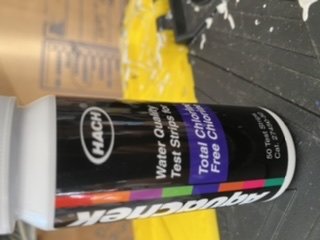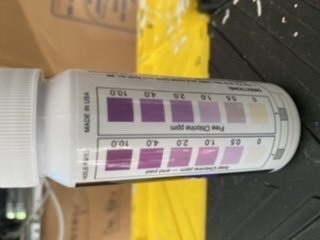@Randy Holmes-Farley Would appreciate your input on my dilemma. Thx
Navigation
Install the app
How to install the app on iOS
Follow along with the video below to see how to install our site as a web app on your home screen.
Note: This feature may not be available in some browsers.
More options
You are using an out of date browser. It may not display this or other websites correctly.
You should upgrade or use an alternative browser.
You should upgrade or use an alternative browser.
Rinsing things with tap water?
- Thread starter Trever
- Start date
- Tagged users None
- Joined
- Apr 20, 2019
- Messages
- 14,292
- Reaction score
- 21,957
Did you see this @brandon429? Thoughts? I dont believe in practice any issues have been observed rinsing sand with tap, but perhaps a risk does indeed exist?
If it is OK for drinking, it is OK for rinsing ordinary solid objects, but not porous rock or sand.
The amount of copper or anything else that can come from traces of left over water are insignificant.
That is not true of high surface area materials, especially those like calcium carbonate which may specifically bind things like copper from the water.
Excellent thread I had not seen it till now, we never knew or considered the copper adherence or uptake into the caco3 matrix for sand or rock
that being said, the sand rinse thread is five years, forty pages, and we -only- use tap water rinsing for hours on both brand new sand and on old sand, we have no bad outcomes finds wood to knock on.
That doesn’t mean anything other than a. we got lucky b. copper must be low, enough to account for compounding in the regions people post sand rinsing from, or there would be accumulations and loss of snails etc. we don’t have outlier outcomes, it’s perfectly streamlined. Any reef on the board can join, same outcome. total losses was two gobies.
It is possible in ten years of rinse on the same bed something might accumulate, that’ll be the thread to show it.
we won’t touch rocks with anything but saltwater. Regarding pre rinsing Marco rocks in tap just to jet off top dusting we did that too but it’s very quick, just a pre wash before they’re set in sw for curing it’s very low contact time. What we are doing to sand would be hours of contact time if the rinsing requires it.
having tested thousands of surfaces for bacteria (swab, take back swab, plate onto 3m gab agar, incubate for forty eight, count, redirect cleaners ad infinitum) in meat production facilities this is my opinion on what assessment for bacteria will show on high surface area places: I will bet all chips that any sponge filter rinsed in tap water will have less/no detritus but the same contamination levels it had before pre rinse for generalized aerobic bacteria.
pre rinse the plate counts will be high
post rinse the plate counts will be high
tap water alone was filthy with bacteria as well, pipe sloughs. We had multi thousand dollar uv on tap, and could still find a colony or two right before uv service time/quarterly
direct chemical risk of uptake acknowledged but practical applications are tracking out as cured of cyanobacteria lol
its the barbarity I find most funny, we cured cyanobacteria more than in any other thread because we tap rinsed it (and the good things too) down the drain. you’re not allowed to do that in reefing but it’s happening as we speak
that being said, the sand rinse thread is five years, forty pages, and we -only- use tap water rinsing for hours on both brand new sand and on old sand, we have no bad outcomes finds wood to knock on.
That doesn’t mean anything other than a. we got lucky b. copper must be low, enough to account for compounding in the regions people post sand rinsing from, or there would be accumulations and loss of snails etc. we don’t have outlier outcomes, it’s perfectly streamlined. Any reef on the board can join, same outcome. total losses was two gobies.
It is possible in ten years of rinse on the same bed something might accumulate, that’ll be the thread to show it.
we won’t touch rocks with anything but saltwater. Regarding pre rinsing Marco rocks in tap just to jet off top dusting we did that too but it’s very quick, just a pre wash before they’re set in sw for curing it’s very low contact time. What we are doing to sand would be hours of contact time if the rinsing requires it.
having tested thousands of surfaces for bacteria (swab, take back swab, plate onto 3m gab agar, incubate for forty eight, count, redirect cleaners ad infinitum) in meat production facilities this is my opinion on what assessment for bacteria will show on high surface area places: I will bet all chips that any sponge filter rinsed in tap water will have less/no detritus but the same contamination levels it had before pre rinse for generalized aerobic bacteria.
pre rinse the plate counts will be high
post rinse the plate counts will be high
tap water alone was filthy with bacteria as well, pipe sloughs. We had multi thousand dollar uv on tap, and could still find a colony or two right before uv service time/quarterly
direct chemical risk of uptake acknowledged but practical applications are tracking out as cured of cyanobacteria lol
its the barbarity I find most funny, we cured cyanobacteria more than in any other thread because we tap rinsed it (and the good things too) down the drain. you’re not allowed to do that in reefing but it’s happening as we speak
Last edited:
Randy Holmes-Farley
Reef Chemist
View Badges
Staff member
Super Moderator
Excellence Award
Expert Contributor
Article Contributor
R2R Research
My Tank Thread
- Joined
- Sep 5, 2014
- Messages
- 67,160
- Reaction score
- 63,511
Hello
I’m a newbie to the reef hobby and am currently setting up a large tank system. I recently used tap water to flow and leak test the system. A fellow reefer mentioned that the dead rock I have in the tank may have absorbed trace elements and nutrients for the tap water. Our local tap water uses chlorine and I register about 95 TDS. Any comment or suggestion you have would be appreciated. Thx
Norb
The chlorine is no concern. Copper would be my concern. I might run cuprisorb on the system for a bit before adding any delicate animals, then start with some snails and if they do fine, you are good to go (IMO).
Thank you RandyThe chlorine is no concern. Copper would be my concern. I might run cuprisorb on the system for a bit before adding any delicate animals, then start with some snails and if they do fine, you are good to go (IMO).
- Joined
- May 25, 2020
- Messages
- 340
- Reaction score
- 341
How many of you have tested your Tap Water? Relatively decent water testing kits are available for fairly reasonable prices to determine specifically how much Chlorine/Chloramine is in your water as well as Copper, Zinc, Mercury, Iron and up to 17+ heavy metals found in your water. You can also get test results from your local water companies over time. There are also test kits to test for various bacteria. It is also a good idea to test your water specifically for Nitrates.








Similar threads
- Replies
- 8
- Views
- 299
- Replies
- 8
- Views
- 406
- Replies
- 6
- Views
- 302
New Posts
-
-
-
New Jersey Live Goods Selling 1 year to 5 year old colonies or frags fr these aquacultured colonies.
- Latest: smitten with ocean life














